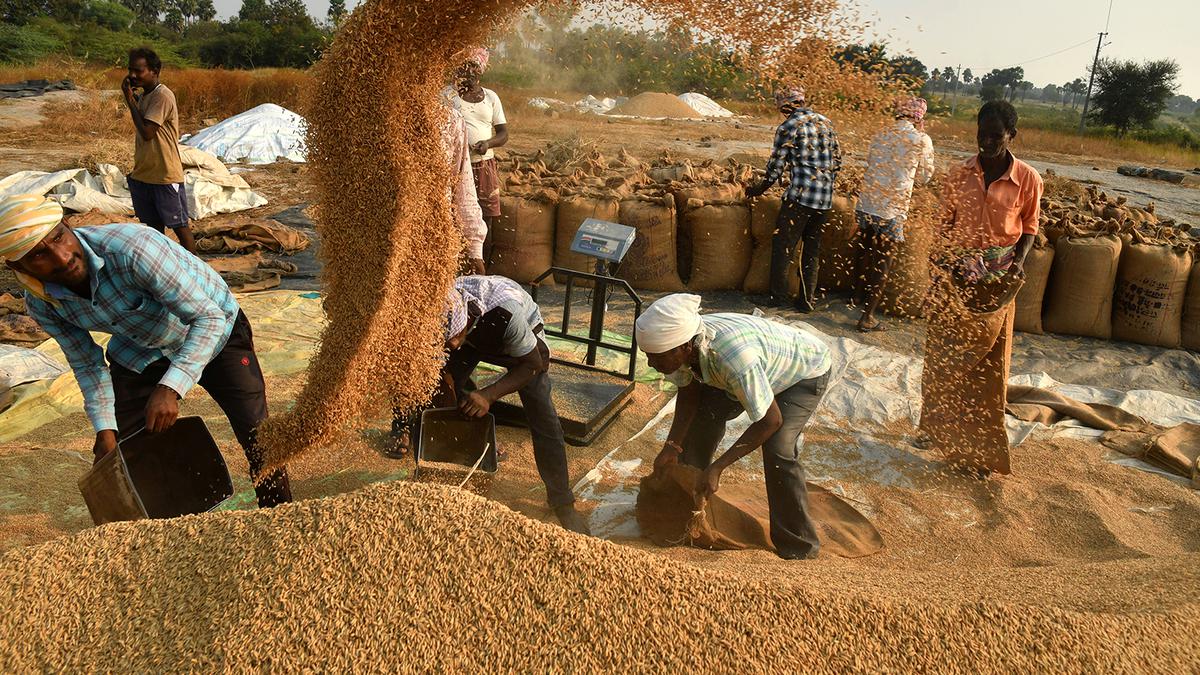NEW DELHI, Jun 19: The government on Wednesday raised the minimum support price (MSP) for paddy by 5.35 per cent to Rs 2,300 per quintal for the 2024-25 kharif marketing season, a move that comes ahead of key state assembly polls.
The Rs 117 per quintal hike in paddy support price comes despite the government grappling with massive rice surpluses but it is significant ahead of elections in states like Haryana, Maharashtra, Jharkhand and Delhi.
The MSP increase in the 14 kharif (summer) crops is the first major decision of Prime Minister Narendra Modi’s third term in office and shows the government’s “clear policy” to keep support prices at least 1.5 times the cost of production, Information and Broadcasting Minister Ashwini Vaishnaw said.
Paddy is the main kharif crop. Sowing of kharif crops usually begins with the onset of the southwest monsoon in June and marketing between October 2024 and September 2025.
Announcing the MSP increase, Vaishnaw said the Cabinet has approved the minimum support prices for 14 kharif crops based on recommendations from the Commission for Agricultural Costs and Prices (CACP).
The total financial implication from the MSP hike is estimated at Rs 2,00,000 crore, about Rs 35,000 crore higher than the previous season, significantly boosting farmers’ income, the minister said.
The MSP for ‘common’ grade paddy has been raised by Rs 117 to Rs 2,300 per quintal, while for the ‘A’ grade variety, it has been hiked to Rs 2,320 per quintal for the upcoming kharif season, Vaishnaw told reporters.
Among cereals, the MSP for ‘hybrid’ grade jowar has been raised by Rs 191 to Rs 3,371 per quintal, while for the ‘Maldani’ variety, it has been hiked by Rs 196 to Rs 3,421 per quintal for the 2024-25 marketing season (October-September).
The support price for bajra has been increased by Rs 125 to Rs 2,625 per quintal, ragi by Rs 444 to Rs 4290 per quintal and maize by Rs 135 to Rs 2,225 per quintal for 2024-25.
To reduce the country’s dependence on import of pulses, the MSP for tur has been raised by Rs 550 to Rs 7,550 per quintal, for urad by Rs 450 to Rs 7,400 per quintal and for moong by Rs 124 to Rs 8,682 per quintal for 2024-25 kharif marketing season.
Similarly, the support price for sunflower seed has been raised by Rs 520 to Rs 7,280 per quintal, for groundnut by Rs 406 to Rs 6,783 per quintal, for soybean (yellow) by Rs 292 to Rs 4,892 per quintal for the upcoming kharif season.
The support price for sesamum has been increased by Rs 632 to Rs 9,267 per quintal, and for nigerseed by Rs 983 to Rs 8717 per quintal for 2024-25.
In the case of commercial crops, the support price for cotton has been raised by Rs 501 each to Rs 7,121 per quintal for ‘medium staple’ and Rs 7,521 per quintal for the long staple variety.
Vaishnaw said the government has taken care of ‘Beej se bazaar tak (from seed to market), keeping in mind the concerns of farmers.
“In the first two terms, the government created a strong base for the economy and farmers’ welfare. On that strong base, we can take a good leap. There is a continuity in policy keeping focus on farmers,” he added.
According to the government, the expected margin to farmers over their cost of production is estimated to be highest in the case of bajra (77 per cent), followed by tur (59 per cent), maize (54 per cent) and urad (52 per cent).
For the rest of the crops, the margin to farmers over their cost of production is estimated to be at 50 per cent, an official statement said.
The Food Corporation of India currently holds a record stockpile of around 53.4 million tonnes of rice, which is four times the required buffer and sufficient to meet demand under welfare schemes for one year without any fresh procurement.
Despite lower rainfall of around 20 per cent across the country since the start of the monsoon season on June 1, weather conditions are now favourable for further advancement of the monsoon, according to the meteorological department. (PTI)


